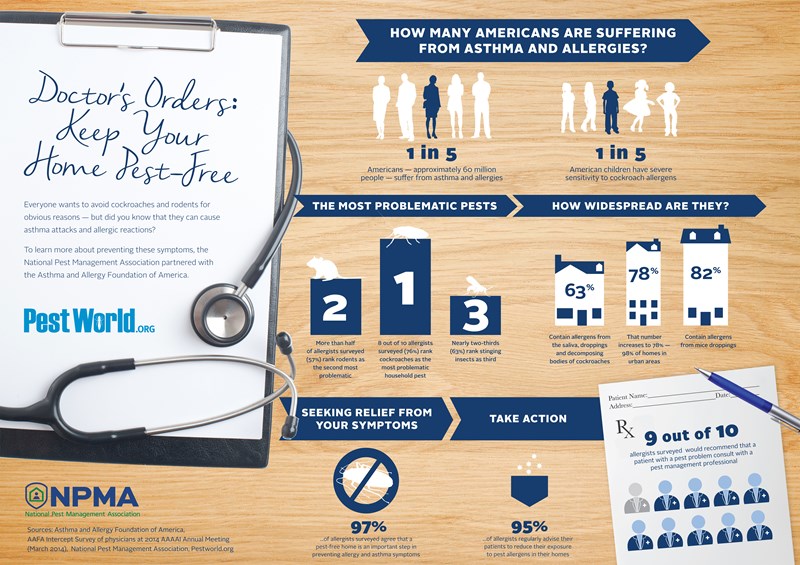READY TO GET STARTED?
REQUEST A FREE ESTIMATE
Fill out the form below or call (888) 466-7849 for a free, no-obligation estimate.
In addition to routine, professional pest control, here are 10 ways you can get rid of bugs.
1. Go around the exterior of your home and seal up any areas where insects could enter your home. Check around windows, doors, plumbing entrances, fan vents, and electrical entrances. If your home has window screens make sure they are intact and if areas are torn or damaged replace them.
2. Make sure to trim all hedges, trees, and other landscaping back away from the home. Creating at least a one foot barrier will keep insects from using easy methods to enter or get close to your home.
3. Always remember that insects are living creatures just like humans and they need food, water, and shelter. Inspect the perimeter of your home, as well as the interior, and pay close attention to areas that could potentially provide all three of these needed resources.
4. All food and beverages should always remain covered or sealed in air tight containers. Following this simple step will eliminate the risk of insects being attracted to your home. If you have fruit out in your kitchen make sure you eat it before it over ripens or store it in your refrigerator. If food or drinks are dropped or spilled make sure that they are cleaned up immediately.
5. Routinely empty all the trash and place it outside in garbage cans with tight fitting lids. All trash cans inside the home should also have lids.
6. Make sure to keep all pet food sealed in air tight containers.
7. Remove extra clutter from your home. Get rid of items that are old and damaged and find a great charity to donate the rest.
8. Keep all doors and windows closed while not in use.
9. Make sure to change all your exterior lighting to low sodium vapor light bulbs. Most insects are attracted to light but they are less attracted to low sodium vapor lighting. Also make sure to point your security lighting away from your home and not directly on it.
10. Don’t Bring Them In! Be careful whenever you travel, move, or bring home the groceries that you check everything before bringing it into your home. Especially as it gets colder make sure to check and clean all your firewood before you bring it in your home.
Each year, the Asthma and Allergy Foundation of America designates May as National Asthma and Allergy Awareness Month, an ideal time to educate the public about triggers, prevention and treatment measures for asthma and allergic diseases. In recognition of this important observation, we want to remind people that a few simple pest prevention measures can go a long way in combating allergies and asthma this spring.
Common household pests, such as cockroaches and stinging insects, can pose a significant threat to asthma and allergy sufferers. Cockroach droppings, saliva, shed skins and other body parts contain allergen proteins known to cause allergy flare-ups and increase asthma symptoms, especially in children. In addition, stinging insects send more than 500,000 people to the emergency room each year due to serious reactions from the pest’s venom.
Many people blame their sneezing and runny noses during the spring season on pollen and grass, however, household pests are often culprits as well. It’s important for people to make an effort to keep the home free of potential triggers, and the first step is practicing good sanitation.
The National Pest Management Association (NPMA) recommends the following tips for safeguarding homes against common indoor allergens caused by pests:

To view full image click HERE
Source: NPMA
UGA Extension entomologist, Elmer Gray, recently wrote an article explaining why the severe winter weather that we’ve experienced in Georgia, and surrounding states, won’t slow down the insect population. In fact, he explains that spring temperatures and moisture conditions will have a far greater effect on insect populations than winter weather. Some insects will die due to the severe weather but most will survive.
Gray explains that insects, having been around for over 300 million years, are adaptive creatures. They are highly adaptable to their surroundings and can survive in extreme conditions. Many insects also overwinter. In the case of insects, overwintering is basically how they survive during the winter months (or how they receive their basic needs). Many insects go through physiological changes that help them survive cold temperatures.
The main concern for insects is that they avoid ice crystals to form inside of their body.
To read the full article, click HERE.
 Ladybugs Seek Warmth in Homes
Ladybugs Seek Warmth in HomesLadybugs are beneficial insects but when they overwinter in your home they become a nuisance pest. They spend the warmer months of spring and summer growing their populations and like other overwintering pests, they seek warmth from the cold temperatures in fall and winter. Many seek shelter under rocks, leaves, or other items found in nature, then you have those that find shelter in homes and buildings.
Although typically harmless, ladybugs can aggravate asthma and cause allergic reactions in people. They can also emit a foul smelling, yellowish fluid that can stain surfaces.
Keeping ladybugs out of your home starts with the usual preventative pest management steps that we typically cover in our blogs: screen all windows, keep doors closed, door sweeps on exterior doors, and seal all cracks and crevices around the exterior of the home (windows, doors, pipes, etc).
If ladybugs have already found their way into your home, use a vacuum cleaner to clean them up. Empty the vacuum bag into a trash bag and make sure it is tightly closed. Discard of the trash bag in a sealed outside container. If you have a ladybug infestation, call a professional pest control company to evaluate, assess, and treat the problem. Call Northwest Exterminating for more on ladybug pest control.
The recent rain has kept more than just human beings inside…it’s caused lots of pests to head indoors as well. You may have seen an increase of bugs in and around your home or office where they are entering to seek shelter from the rain.
Easy steps to keeping pests out: